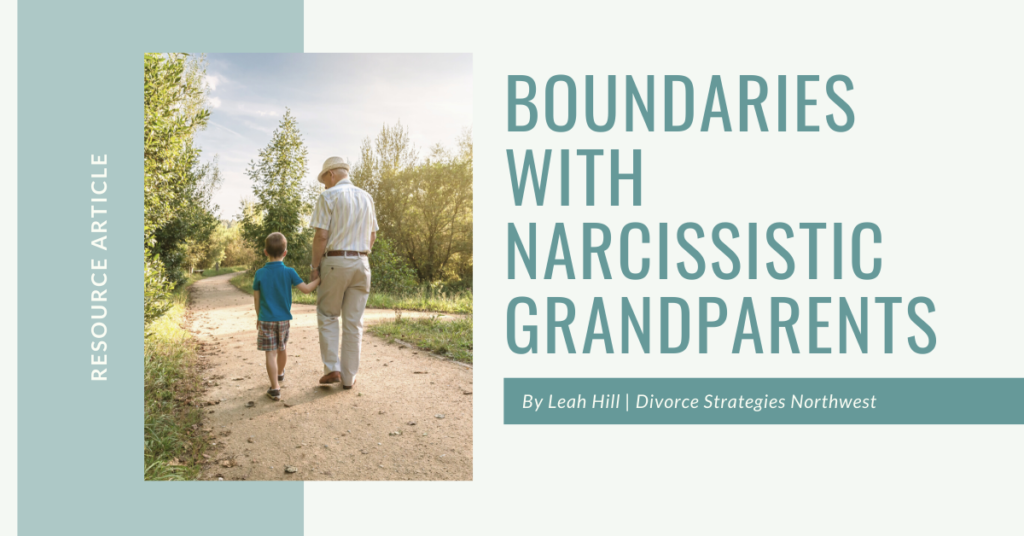
Protecting your children from abusive grandparents shows wisdom and strength.
As you begin your journey and leadership as a single parent, it is important to choose who you will allow to be around and influence your children. Perhaps you’ve come to the realization that one or both of your own parents have narcissistic personality disorder. This can be hard to process, but also empowering, as you recognize your tremendous responsibility to protect your children from dangerous adults. One of the most confusing and difficult issues many adult children of narcissistic parents face is how to navigate the relationship between our children and our parents.
The emotional abuse heaped on a child by narcissistic parent(s) can take years to understand and overcome. Narcissistic conditioning is the behavioral programming we receive (subconsciously) after experiencing long-term narcissistic abuse. Children of narcissists are programmed to react in ways that are convenient for narcissists — not for the child’s happiness. As you recall the manipulation, criticism and blame, work to establish firm boundaries to protect your children. Knowing their potential for harm, shielding your children from manipulative, toxic grandparents shows maturity, wisdom and strength.
Even after identifying the dysfunction, neglect and abuse we endured, we may make misguided assumptions about our parents (as grandparents). Idealization and hope can have serious consequences for ourselves and our children. Acknowledge and accept the truth about who your parents are.
As a society, we place great importance on extended family. Grandparents are portrayed as harmless old people who love and spoil their grandchildren. Narcissistic grandparents are not harmless. A toxic grandparent has an over-inflated ego, a pathetic need for validation, and a tragic lack of empathy for other people’s feelings. This need includes people closest to them—their own family.
Narcissists are obsessive students of psychological warfare, and they have an arsenal of weapons at the ready. Lacking empathy, they do not follow basic rules of fairness and reciprocity in their relationships, often especially with their children. To support their persona of superiority and entitlement, narcissistic parents use predatory tactics to “win” in their ceaseless game of controlling and besting others. Like a nail gun on rapid fire, narcissistic parents are hurt machines, creating havoc and damage in the lives of their children, choosing aloof oblivion to the pain they cause.
Incapable of True Connection
Narcissists carefully select unwitting, loving individuals to manipulate and guzzle narcissistic supply from. They will continue to demand control and take from you long past when your cup is empty. Children are wonderful sources of narcissistic supply—their innocence, natural adoration, trust and love. Ensuring a good source of narcissistic supply is the main reason narcissists choose to have children, often many.
Large families with narcissistic leadership appear glossy from the exterior, but from within they are woefully dysfunctional, controlling, and often abusive. With narcissists, the only love is from children to the parent / grandparent; there is no sincere reciprocation. Narcissists are incapable of true connection—they cannot comprehend unconditional love. These emotionally vacuous vampires are incapable of healthy, loving relationships.
A narcissistic individual feeds off “supply” to keep their fragile false self in place. They will employ whatever tactics needed to control others, feed their ego and force compliance. If yours was a controlling, emotionally-abusive childhood, take steps to protect your own children from this manipulative, harmful behavior.
Leah Hill | CEO and Founder, Divorce Strategies Northwest
Naively, most children love and adore their grandparents—even narcissistic ones. Grandchildren provide a never-ending source of narcissistic supply, despite a narcissist’s lack of true connection or genuine care. Narcissistic supply is the attention, love, admiration, or even fear that non-narcissists show towards them. When their approval is withheld (which is often), a child feels as if they are are responsible for their parents’ / grandparents’ expression of disappointment, frustration and rage. This burden weighs heavily on a child, who wears this unhealthy responsibility like a backpack of rocks, always hoping to garner the narcissist’s favor, love and approval. Narcissistic parents / grandparents discourage / disallow independence and individuation—it would be a threat to their control.
A narcissistic individual needs “supply” to keep their fragile false self in place. They will employ whatever tactics are needed to control others, feed their ego, and relentlessly force compliance to service their selfish needs. If yours was a controlling, emotionally-abusive childhood, take steps to protect your own children from this manipulative, harmful behavior. Do not allow your children to rely on narcissists for love and approval. From your own toxic childhood, you know this exhausting, twisted marathon of emotional neglect has no finish line.
Do not allow your children to rely on narcissists for love and approval. From your own childhood, you know this exhausting, emotionally-abusive marathon has no finish line.
Leah Hill | CEO and Founder, Divorce Strategies Northwest
Narcissists bully and terrorize those around them with emotional reactions. Over time, we learn to expect these reactions… we protect ourselves with empowerment, preparation and support.
Emotional Neglect
While they may appear “fine”, children of narcissists endure profound and ongoing psychological neglect and emotional abuse that result in disrupted attachment, insecure identity formation, unstable self-esteem, and complex traumatic stress. Adding to the trauma, children in these intensely dysfunctional families are often taught that (their parents) are above reproach, and that the children themselves are to blame for the treatment they receive. This cyclical form of gaslighting is often magnified for kids whose narcissistic parents present a high-achieving, charismatic, pious, “plastic-perfect” persona to the world around them.
Narcissistic parents draw their supply from their children and grandchildren. Achieved with guilt, harsh control, and sudden, short-lived “acts” of kindness, insecure narcissists do not seek understanding nor acceptance. These monsters weaponize parenting by requiring children into forced compliance, command appreciation and adoration, or demand tearful apologies. The narcissistic parent / grandparent drinks in control and adulation with more manipulation, gaslighting and dramatic histrionics. These oppressive behaviors fortify the narcissist’s false sense of grandiosity, bravado, and self-righteous admiration.
Young children will not understand your well-intentioned efforts to rationalize with them about how abusive grandparents are not healthy people. Narcissistic liars are experts at manipulation and the “art of the spin.” For now, explaining to your children concepts of emotional neglect and emotional abuse is inappropriate, fruitless, and confusing for them. Your best defense is a strategic offense.
Unhealthy Toxicity
Children, especially young ones, are naively trusting of adults, including grandparents. Children learn by watching and listening to the adults in their lives. Narcissistic people have severe emotional deficits that produce an entirely egocentric worldview. The confusion and “emotional whiplash” of a relationship with a narcissist will cause your children to become manipulative, skittish and deceitful— this is survival.
Toxic grandparents may feel some love for their grandchildren, but they cannot help who they truly are. Their victims are anyone in their sphere of influence, with their critical, manipulative, supremely selfish and judgmental behaviors. Gossip is a proud narcissist’s fuel, masked under the evil guise of “worry” and “concern“. A child’s psyche is fragile, impressionable, and ill-equipped to manage the complexity of emotional abuse. Through no fault of the child, a narcissist’s critical words, narrow perspectives and harsh attitudes often become (the child’s) inner voice…. this can lead to confusion, anxiety, depression, headaches, ulcers and other serious illnesses.
Individuals with narcissistic personality disorder are abusive and emotionally unwell; they have no ability to feel empathy or genuine love. They live for appearance and show—any challenge to their façade of perfection is met with immediate “damage control” of spin, manipulation and lies. These individuals do not truly love… they have an addiction to being loved. You have a grand responsibility to prevent your children from being hurt, used, and confused. As a healthy adult, it is your moral imperative to keep an unhealthy grandparent from feeding off your children’s innocence.
You have a responsibility to prevent your children from being hurt, used, and confused. Your moral imperative is to keep an unhealthy grandparent from feeding off your children’s innocence.
Leah Hill | CEO and Founder, Divorce Strategies Northwest
Talk with your children about the benchmarks of a healthy relationship. By doing so, you are helping them develop their own personal boundaries, encouraging them to trust their intuition, and listen to their inner voice. Proudly teach your children the skills needed to deal with toxic people they may encounter. Allow your children to bask in the confidence and freedom of your unconditional love.
Undermining Your Parenting
Narcissistic grandparents will not support your leadership in parenting; they will challenge and attack it. Unless you’re present while your parents are with your children, you won’t realize this insidious abuse is sneaking into your own family. A narcissistic grandparent will not accept your parental authority, creating chaotic confusion. You won’t see the dangerous effects of your parent’s lack of respect for you until your children begin to defy you with the same harsh accusations, inappropriately tight grip, and snide, critical taunts you recall from childhood. Narcissists demand complete authority and narcissists do not change.
While healthy grandparents can enrich your child’s life, grandparents—healthy or narcissistic— are not essential to your children’s development. Your children will not feel an emptiness if grandparents are not part of their lives. Conversely, tolerating your parents in your family’s life could induce the presence of emotional abuse and inflict toxicity into your children’s reality— be judicious in your choice to protect your children from abuse.
Unless it serves their needs and selfish agenda, narcissistic parents will not support you (and if they appear to, watch out for the accompanying lies and manipulation). Innocent children are tempting targets for narcissistic grandparents who refuse to be held accountable. Narcissists do not respect individuality and personal choices; any diversion from their strict control will be admonished, mocked, criticized, and squelched. Their pathetic need for admiration and control is the veiled motivation behind the hollow narcissist’s every move.
Enforcing Boundaries
Adult children of narcissists often struggle with enforcing boundaries with their parents. Replicating similar dynamics in their adult relationships is common and difficult to avoid. Feelings of guilt and fear prevents adult survivors from putting a firm barrier between them and their abusive parent(s). Do not allow conflicted feelings to prevent you from putting an invisible fence of protection around your children.
Just as you would protect your children from a toxic spill, shelter your innocent children from abusive adults. This is good parenting. You know your parents, and you recognize that their behavior is driven by their addiction to controlling everyone around them. By manipulating your children, your parents carry on the intense emotional and psychological abuse you suffered in their care. No matter the pressure(s) you face, you and your children will benefit from your bravery to stop generational abuse.
By manipulating your children, your parents can carry on the intense emotional and psychological abuse you suffered in their care.
Leah Hill | CEO and Founder, Divorce Strategies Northwest
Some adult children of narcissistic parents choose to limit or end contact, to protect their children and themselves. Others find ways to structure and contain time between their children and parents, keeping a close eye to monitor the inevitable narcissistic abuse. Preventing a narcissistic grandparent from having any contact with your children is wise parenting. ‘No contact’ is a serious decision that will likely have a ripple effect on the entire family. While challenging at times, cutting ties with toxic family members becomes easier with time and is the only way to stop the abuse for good. Despite the backlash, you have a responsibility to protect your children from harm, including those who claim “love”, but who have a history of causing painful dissonance, strife, and chaotic confusion.
Taking Control
As an adult, realize and embrace that your narcissistic parent has no power in your life, but acknowledge that they can damage and hurt your children. By keeping your parents away from your kids, you are intentionally breaking the harmful cycle of narcissistic abuse that injured you. Protect your children, nurture their individuality, and set boundaries that you wish had protected you as a child. When you expose a narcissist and are no longer a source of “supply”, you will likely experience narcissistic rage, as the desperate narcissist realizes that they have lost control of you.
As the narcissist’s mask falls, they will reveal their true false self. The vengeance and vitriol they spew may make this person unrecognizable to you. Seek professional help for support through this painful, confusing process. A skilled therapist will provide support and sort through the conflicting messaging, projection, and intense emotions you will experience. A hard but wise decision to make, choosing to have no contact with your narcissistic family member(s) will stop your suffering, and most importantly, will disallow them from abusing your own children. If you don’t stand up to evil, you are a participant.
Ensure that your children have relationships with positive, healthy, engaging adults who support your values, affirm, and who love you and your children for who you are. Be an example for your children by reflecting on your own flaws and being honest with them. Demonstrate healthy communication by sincerely apologizing for misunderstandings and wrongdoings… and then move on. In contrast to a narcissist, a truly loving adult will consistently support and encourage a child’s self-confidence as they grow and make independent decisions.
In contrast to a narcissist, a truly loving adult will consistently support and encourage a child’s self-confidence as they grow and make independent decisions.
Leah Hill | CEO and Founder, Divorce Strategies Northwest
The strength and personal integrity you show by protecting your children will help you heal. The actions you take on behalf of your children will empower you, and be a continued catalyst for courage and positive experiences. As parents, adult children of narcissists have the opportunity to achieve healing through giving the kind of unconditional love they did not receive in their family of origin.
Offer your children sincere emotional support and unconditional love. Give gifts with no strings attached! Demonstrate how to create safe, healthy relationships, and boundaries with trusted friends and family. Make a conscious choice to live free from the realities of narcissistic abuse.
Your Trusted Partner
Whether you’re contemplating a divorce, have already started the process, or are far into the proceedings, do you wish you had someone to share with you the inside scoop on how to save money, time and emotional energy on your divorce?
Our team is available for Support On-Demand to discuss the many scenarios, options, and implications of separation or divorce, via telephone or videoconference during this time. Feel free to get in touch with us; we are here for you!





[…] behavior in their own children and seek professional help if they are experiencing problems with a narcissistic grandparent; narcissist grandparents pose a significant threat to both parents’ and their […]